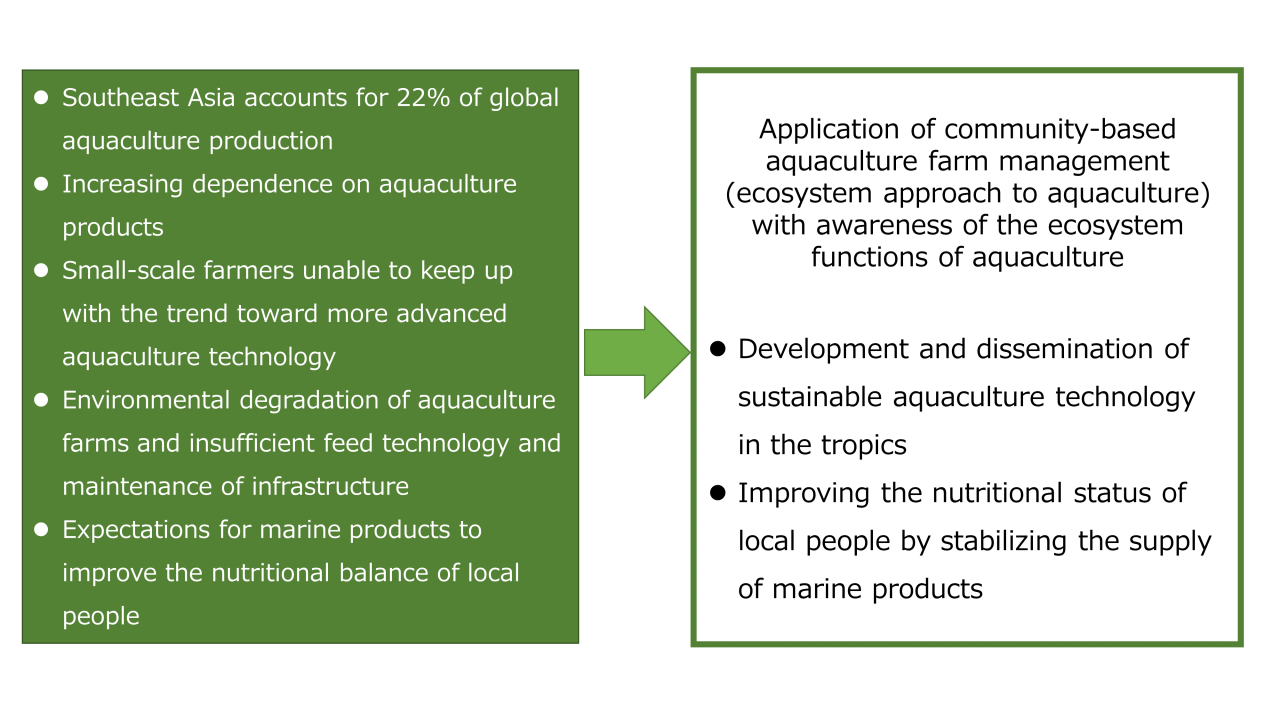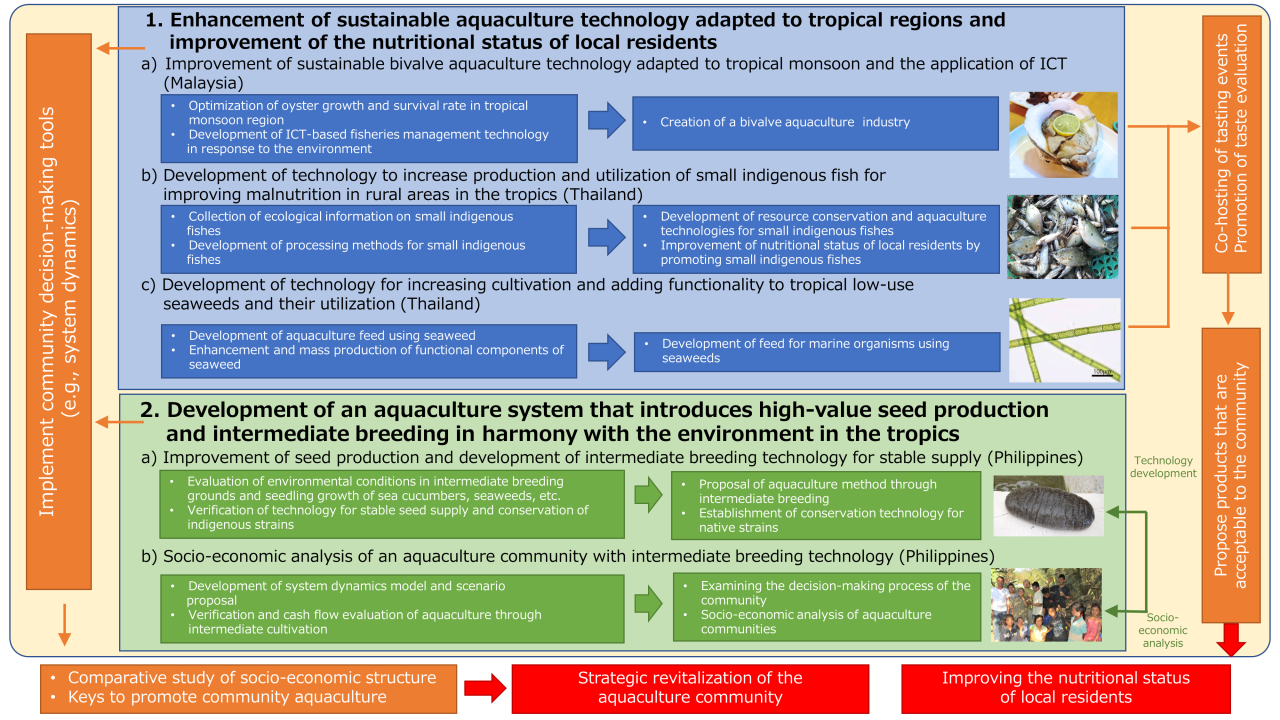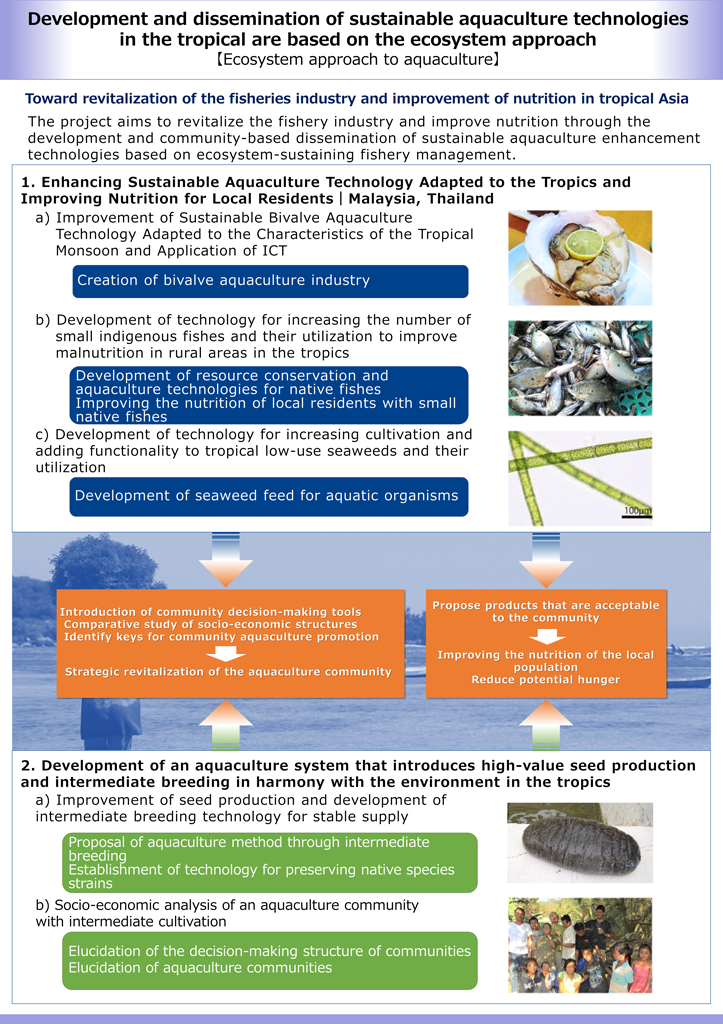"Ecosystem approach to aquaculture"
Development and dissemination of sustainable aquaculture technologies in the tropical area based on the eco-system approach
2025-08-12
Background
For fishing and farming communities in the Southeast Asian region, marine products are essential as an important source of income as well as an important source of nutrition such as protein and minerals. However, the socio-economic background of rural communities, including small-scale aquaculture operators, is becoming more complex. In order to develop and disseminate practical aquaculture technologies, an ecosystem approach is effective, in which local needs and the use of aquaculture fishing grounds are thoroughly discussed with relevant stakeholders in advance. In doing so, multiple scenarios can be presented as a decision-making tool for the community, enabling them to understand and share the direction of environmentally harmonious and sustainable aquaculture.
Ecosystem approach: A process for humans to use natural resources sustainably and rationally without destroying them while preserving ecosystems.
Objectives
The project will develop and disseminate sustainable aquaculture technology in the tropics by applying community-based aquaculture farm management that maintains ecosystem functions (ecosystem approach to aquaculture), and improve the nutritional status of local communities by stabilizing the supply of aquatic products.
Research Themes
- Enhancement of sustainable aquaculture technology adapted to tropical regions and improvement of nutritional status of local residents
- Development of aquaculture systems that introduce high-value seed production and intermediate breeding in harmony with the environment in the tropics
Target Countries
Malaysia, Thailand, Philippines
Target Beneficiaries
Small-scale aquaculture producers and local communities, partner research institutions and universities, partner governments
Project Leader
HONDA Satoshi (Fisheries Division)
Related Pages
JIRCAS Report
Future Science Talent Academy – 11th Session: Online Lecture for First-Year Students of Aichi Prefectural Meiwa Senior High School Junior High Division
On Thursday, September 25, 2025, the Japan International Research Center for Agricultural Sciences (JIRCAS) held the 11th session of the Future Science Talent Academy in an online format. A total of 99 first-year students from the Junior High Division of Aichi Prefectural Meiwa Senior High School participated in the lecture, which was themed “Knowledge Needed for Biological Observation and Perspectives for Inquiry-Based Learning.”
Fisheries Division Researcher SAITO Minoru Receives Best Oral Presentation Award at the 5th Thailand International Symposium on Natural History Museums (TISNHM 2025)
At the 5th Thailand International Symposium on Natural History Museums (TISNHM 2025), held at the National Science Museum of Thailand in Pathum Thani (near Bangkok) from November 27 to 29, 2025, Researcher SAITO Minoru from the Fisheries Division received the Best Oral Presentation Award. The event was organized to share knowledge and techniques related to natural history research and museum exhibitions and brought together researchers, museum professionals, and students from nine countries, mainly in Southeast Asia.
JIRCAS Participates in the Tsukuba Express Festival 2025
On November 3, 2025, the Japan International Research Center for Agricultural Sciences (JIRCAS) participated in the Tsukuba Express Festival 2025, organized by the Metropolitan Intercity Railway Company and held at the Tsukuba Express General Base in Tsukubamirai City, Ibaraki Prefecture. JIRCAS exhibited jointly with the Tsukuba Science Tour Office.
Field Information
-
Pick Up
796. Research on Asparagopsis Cultivation Contributes to Methane Gas Reduction
Methane from cow and sheep burps is one of the greenhouse gases thought to have a significant impact on climate change. Recently, it has been shown that methane emissions from cattle can be reduced by feeding them seaweed. The seaweed called Asparagopsis is particularly effective in suppressing methane emissions and has attracted considerable interest. The cultivation of seaweed for methane reduction is now being started all over the world and is expected to become a new seaweed industry.
-
Pick Up
553. World Oceans Day
June 8 is World Oceans Day. It was established to create an opportunity to raise global awareness of the challenges facing the international community regarding the oceans. Also, 2022 is the International Year of Artisanal Fisheries and Aquaculture. In today's Pick Up, we introduce two examples of international joint research related to small-scale fisheries and aquaculture in the field of fisheries featured in the JIRCAS Research Highlights.
-
Pick Up
520. Three Major Farming Methods for Shrimp Imported to Japan
The Japanese people love shrimp, and in 2019 they consumed more than 230,000 tons of shrimp annually, making them the second largest consumer per capita in the world, after the United States. According to government statistics, about 70% of the shrimp imported to Japan comes from Southeast and South Asian regions such as Vietnam and India. Shrimp caught in these countries were exported until the 1980s, but since the 1990s, production has shifted mainly to aquaculture due to dwindling resources. In addition, 2022 is the International Year of Artisanal Fisheries and Aquaculture. In this Pick Up, we will introduce some of the less commonly known methods of shrimp farming.
Research Highlights
Article and Publication
2025
-
Yurimoto, Tatsuya (2025) Ecological responses of pen shell, Atrina lischkeana, and ark shell, Scapharca kagoshimensis, to sediment characteristics in a temperate tidal flat. International Journal of Aquatic Biology, 13 :1-9.
-
Yurimoto, Tatsuya , Kassim, Faizul Mohd , Rahim, Masazurah Abdul (2025) Seasonal variation in feeding activity and fatness of cultured oysters in the Merbok Estuary, Malaysia. Egyptian Journal of Aquatic Research, https://doi.org/10.1016/j.ejar.2025.11.001
-
Yurimoto, Tatsuya , Kassim, Faizul Mohd , Rahim, Masazurah Abdul (2025) Improvement of the Nursery Upweller for Young Oysters in Tropical Mangrove Estuaries. Aquatic Sciences and Engineering, 40 :262-271. https://doi.org/10.26650/ASE.2025.1738425
20010512.4 MB
-
Matsuda, Ryuya , Kuwano, Kazuyoshi (2025) A Demonstration of Bromoform-Producing Gametophyte Culture for a Red Alga, Asparagopsis taxiformis in Laboratory Conditions. Marine Biotechnology, 27 :115-. https://doi.org/10.1007/s10126-025-10493-2
20008921.4 MB
-
Okutsu, Tomoyuki , Rakbanjong, Natthida , Shikina, Shinya , Miwa, Misako , Wonglapsuwan, Monwadee (2025) Cryopreservation of spermatogonia of the giant freshwater prawn, Macrobrachium rosenbergii, using slow and ultra-rapid freezing. Cryobiology, 119 :105242-. https://doi.org/10.1016/j.cryobiol.2025.105242
20008845.3 MB







